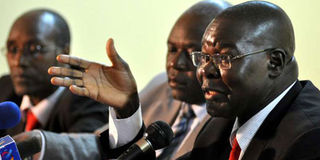Country to experience hotter weather

Director of Meteorological Services James Kongoti addresses the press on weather patterns at their headquarters. The department says the rest of the country has dried up but will continue to experience huge weather swings. FILE PHOTO | GERALD ANDERSON | NATION MEDIA GROUP
What you need to know:
- In South Africa, soaring temperatures have led the region to experience one of its worst droughts in recent history.
The heavy rains are finally over, but the El Niño phenomenon is not as its effects and those of climate change will stay with the country for the coming months and even years, the weatherman has said.
Apart from the Lake Victoria Basin, highlands west of the Rift Valley, Central and South Rift Valley, which are still experiencing minimal volumes of rain in between sunny intervals – a condition that will last till mid-February – the rest of the country has dried up but will continue to experience huge weather swings.
Nairobi especially and the Central region have for the last few weeks been experiencing such oscillations with the weather shifting between warm to very cold and cloudy.
The National Meteorology Department says the return of the sun after a period of heavy rains will be beneficial to farmers in most parts of the country as crops planted in the areas that received early rainfall towards the end of last year have matured.
Some of these areas, the meteorology department says, received up to 175 pc above normal rains.
This is apart from the north-western counties of Turkana, West Pokot and Samburu where “the sunny intervals will continue to have a negative impact on the growth of pasture and vegetation for livestock kept in this region”.
Also negatively affected by the cessation of the rains are the north-eastern counties of Marsabit, Mandera, Wajir, Garissa and Isiolo whose effects will be similar to those of north-western counties.
“The Central highlands including Nairobi, counties of Meru, Murang’a, Kiambu, Nyeri, Embu, Nyandarua, Tharaka Nithi and Kirinyaga, are expected to experience sunny intervals,” said a statement by James Kongoti, the Director of Meteorological Services.
The weatherman has also said that day time temperatures have increased throughout the whole country while night time temperatures have generally decreased except over a few areas in the north-east, parts of Coast and the Jomo Kenyatta International Airport (JKIA).
This is so as effects of climate change continue ravaging the whole world with a general rise in temperature being experienced in most countries.
In South Africa, soaring temperatures have led the region to experience one of its worst droughts in recent history.
The year 2015 was named the hottest in world history.





